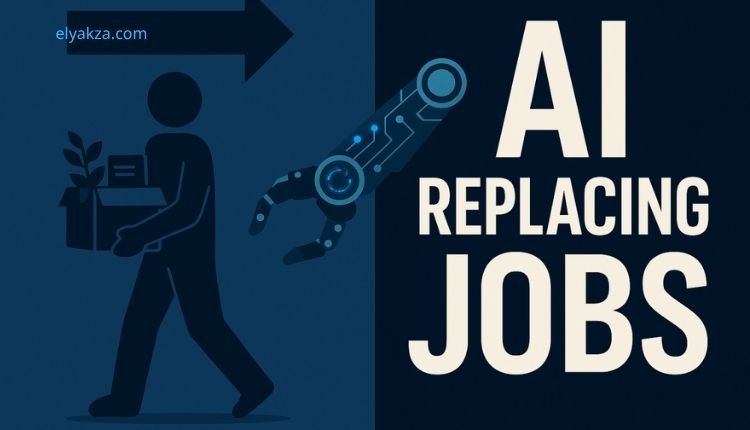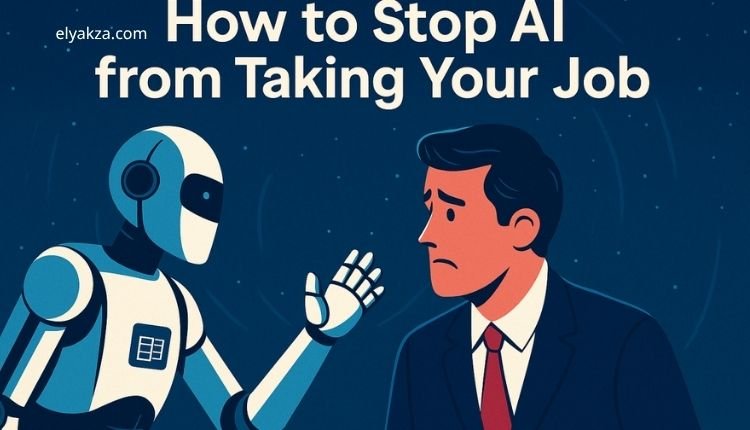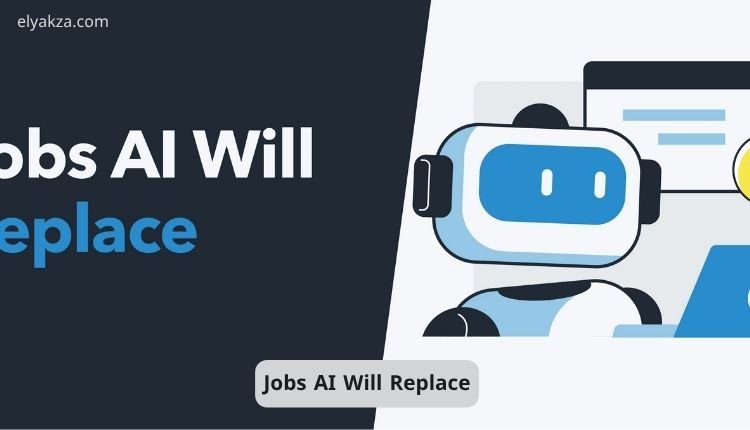The rise of artificial intelligence (AI) is no longer just a buzzword—it is a fundamental force reshaping industries, economies, and the way we live. In just the past decade, AI has evolved from experimental tools to real-world systems performing tasks once thought impossible. From self-driving cars to advanced medical diagnostics, AI is increasingly capable of matching or even surpassing human abilities in specialized fields.
قائمة المحتويات
But what does this mean for the future of work? Which jobs will AI replace first, and which careers will stand the test of time? Reports from McKinsey, PwC, and the World Economic Forum suggest that up to 60% of jobs will require major transformation by 2050. Some jobs will disappear entirely, while others will be redefined to work alongside intelligent systems.
This article takes a deep dive into the jobs most at risk from AI, the pace of disruption, and the opportunities available for workers willing to adapt. If you’re wondering how to safeguard your career in an age of automation, you’ve come to the right place.
The Acceleration of AI in the Workplace
Artificial intelligence is developing at breakneck speed. Just a decade ago, AI was mostly confined to research labs and experimental products. Today, it is embedded in daily life—from chatbots answering customer service queries to recommendation systems shaping what we watch, read, and buy.
Predictions About AI’s Impact on Jobs
Several influential studies point toward massive disruption:
- McKinsey projects that by 2030, nearly 30% of U.S. jobs could be automated.
- Goldman Sachs estimates that up to 300 million jobs worldwide could be impacted by AI.
- World Economic Forum highlights that AI will alter not just low-skill work, but also white-collar professions like law, finance, and journalism.
The transformation will not be immediate but will unfold over the next 10 to 30 years. Some roles are already changing, while others will gradually evolve as businesses adopt cost-saving AI solutions.
“Read Also: Your Phone Is Hacked“
Which Jobs Will AI Replace First?
AI will not impact all professions equally. Jobs that involve repetitive tasks, structured data, or predictable decision-making are most at risk. Let’s break down the categories:

1. Administrative and Clerical Jobs
Administrative roles are highly vulnerable to AI automation. According to a 2024 study by the Institute for Public Policy Research, 60% of administrative tasks can already be automated.
- Data entry clerks: AI can process, validate, and analyze large datasets faster and more accurately than humans.
- Schedulers and receptionists: Virtual assistants like ChatGPT and Google’s AI scheduling tools are already handling these functions.
- Back-office roles in finance and insurance: Companies such as BlackRock are cutting costs by streamlining administrative operations with AI.
These jobs, once considered stable office work, could be among the first to vanish.
2. Accounting and Financial Analysis
Bookkeeping and financial modeling, long dependent on repetitive calculations and report generation, are highly exposed.
- AI platforms can generate real-time financial reports without human input.
- Basic auditing and tax preparation can already be automated using platforms like Intuit’s AI-enhanced TurboTax.
- JPMorgan Chase has begun automating routine banking tasks, placing 20% of financial analysts’ roles at risk by 2030.
While senior roles in finance that require strategic insight will remain, entry- and mid-level positions could see significant downsizing.
3. Legal and Paralegal Work
AI-powered legal research platforms are revolutionizing the legal industry. Tools like Harvey and CoCounsel can review and analyze contracts with over 90% accuracy.
Jobs at risk include:
- Paralegals handling document review.
- Contract drafters creating standardized legal agreements.
- Legal researchers summarizing case law.
However, courtroom advocacy, negotiation, and complex legal strategy will still require human expertise.
4. Content Creation and Media
Generative AI is transforming how content is created. Platforms like DALL·E and GPT-based systems can produce articles, ad copy, images, and videos in seconds.
- Copywriting for ads and SEO blogs is increasingly handled by AI.
- Graphic design for basic layouts and social media posts is being automated.
- News reporting of routine financial or sports updates can be generated by algorithms.
A Pew Research Center study predicts that by 2035, 30% of media jobs could be automated. However, high-level creative work, storytelling, and investigative journalism will endure longer.
“Read Also: AI in Drone Defense“
5. Customer Service
Customer service is already seeing massive automation. Chatbots, voice assistants, and AI-driven support systems are replacing call centers.
- AI provides 24/7 availability and handles high call volumes efficiently.
- Businesses save on labor costs while improving consistency.
- A growing number of consumers prefer AI-driven interactions for simple issues.
Jobs such as call center agents, email support staff, and front-line service representatives are among the most vulnerable.
6. Technology and Software Development
It might seem ironic, but even software developers face disruption. AI tools like GitHub Copilot and DeepMind’s AlphaCode can generate code, troubleshoot bugs, and even design simple applications.
- Routine coding tasks are at risk.
- AI can test, optimize, and deploy applications faster than humans.
- By 2040, the World Economic Forum estimates 40% of programming tasks will be automated.
However, jobs involving complex system architecture, cybersecurity, and innovative research will remain in demand.
“Read About: Cloud Virtual Machines“
Which Jobs Will AI Replace Last?
While AI is advancing rapidly, not every profession is equally at risk. Roles requiring empathy, creativity, and human connection remain safer.
1. Healthcare Professionals
AI is already assisting with medical imaging, diagnostics, and robotic surgeries. Yet, patient-facing roles—such as nurses, therapists, and doctors—require emotional intelligence and trust.
A 2023 Lancet study found that only 25% of medical administrative tasks could be automated by 2035. The rest will still need human involvement.
2. Education and Teaching
AI can provide adaptive learning platforms, but teaching goes far beyond transferring knowledge. Teachers mentor, inspire, and emotionally support students.
According to a 2024 OECD report, only 10% of teaching tasks could be automated by 2040. Roles like early childhood education, philosophy, and arts instruction remain especially human-dependent.
3. Skilled Trades and Manual Labor
Jobs that require physical dexterity and adaptability are much harder to automate.
- Construction workers.
- Electricians and plumbers.
- Repair and maintenance specialists.
These careers are protected for the foreseeable future, since AI-driven robotics still lack the flexibility and cost-efficiency needed for dynamic real-world environments.
4. Leadership and Strategic Roles
High-level management depends on qualities that AI cannot replicate: judgment, adaptability, and vision.
- CEOs and executives must inspire teams and navigate uncertainty.
- Entrepreneurs create new markets, products, and opportunities.
- Policy leaders balance ethics, governance, and human welfare.
AI may assist in decision-making, but leadership will remain distinctly human.
“Read About: Cheap Homeowners Insurance Quotes“
How Workers Can Prepare for the AI Revolution
The looming question is: What should workers do to protect themselves?

1. Develop AI-Resilient Skills
- Critical thinking and problem-solving are harder to automate.
- Emotional intelligence and people management will remain crucial.
- Digital literacy ensures you can leverage AI instead of being replaced by it.
2. Target Growth Industries
Focus on industries where AI augments rather than replaces humans:
- Healthcare
- Education
- Renewable energy
- Cybersecurity
3. Lifelong Learning and Reskilling
Workers who adapt and continuously upgrade their skills will fare better than those who resist change. Governments and companies must also invest in retraining programs to support this transition.
Jobs AI Will Replace: the Conclusion
Artificial intelligence is reshaping the global workforce faster than many expected. From administrative jobs to financial analysis and legal research, millions of positions are on the brink of automation. Yet, opportunities remain for those willing to adapt.
The future of work will not be purely human or purely AI—it will be a hybrid economy where intelligent systems handle routine tasks, and humans focus on creativity, empathy, and strategic thinking.
If you’re wondering how safe your career is, the answer depends on your ability to evolve with technology. Instead of fearing which jobs AI will replace, the real question is: how can you make yourself irreplaceable in the age of artificial intelligence?
يتميز أحمد فتحي بكونه كاتبًا اقتصاديًا يعتمد على تبسيط المفاهيم الاقتصادية المعقدة وربطها بالأحداث اليومية التي تهم القارئ. يكتب بشكل احترافي عن النظريات الاقتصادية، الأسواق المالية، السياسات النقدية والمالية، مع تحليل معمق للأخبار والتقارير الاقتصادية العالمية والمحلية.
من خلال خبرته، يقدم أحمد فتحي محتوى يساعد القراء على فهم حركة الاقتصاد وتأثيرها المباشر على حياتهم اليومية، مثل التضخم، أسعار الفائدة، والتجارة الدولية. أسلوبه يجمع بين الدقة الأكاديمية والطرح السلس، مما يجعله مصدرًا موثوقًا للمهتمين بعالم الاقتصاد وصناع القرار على حد سواء.

